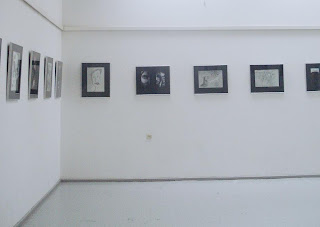
Our Gimnasium.

Adolfas Sapoka Memorial room.
Our gimnasium is named after famous Lithuanian Adolfas Šapoka. He was a well-known historian in our country and abroad, too. He wrote the book "The history of Lithuania". We look up to him and have his memorial room. New students of this gymnasium go there to learn more about the person whose name they see every morning, when they come to school.
Our gimnasium is named after famous Lithuanian Adolfas Šapoka. He was a well-known historian in our country and abroad, too. He wrote the book "The history of Lithuania". We look up to him and have his memorial room. New students of this gymnasium go there to learn more about the person whose name they see every morning, when they come to school.

Our orchestra.

Orchestra room.

Geography lesson.
This is the a geography class. Obviously, half of the people are pretending to study in front of the camera, as you can see. No, I am just kidding, more than half of the people are studying. Maybe 2/3 of the class was actually studying. Anyway, the important thing that our geography teachers are great and the students are even better!
This is the a geography class. Obviously, half of the people are pretending to study in front of the camera, as you can see. No, I am just kidding, more than half of the people are studying. Maybe 2/3 of the class was actually studying. Anyway, the important thing that our geography teachers are great and the students are even better!

Canteen.
This is our canteen. Here our students spend their free time between the lessons. As you see in the photo, there they can eat, chat or do their homework. It is like our school center. :) School canteen looks very calm in this picture, but it gets really crowded during the lunch breaks. So you have to be very patient if you want to eat and fight for your space or you will go back to the lessons with an empty stomach. It used to be a common complaint, as far as I know, but now everybody seems to be happy about it. You can notice that this canteen is pretty big, other schools in Utena have twice or even four times smaller ones! People who make food are very friendly and funny.
This is our canteen. Here our students spend their free time between the lessons. As you see in the photo, there they can eat, chat or do their homework. It is like our school center. :) School canteen looks very calm in this picture, but it gets really crowded during the lunch breaks. So you have to be very patient if you want to eat and fight for your space or you will go back to the lessons with an empty stomach. It used to be a common complaint, as far as I know, but now everybody seems to be happy about it. You can notice that this canteen is pretty big, other schools in Utena have twice or even four times smaller ones! People who make food are very friendly and funny.
.JPG)
Library.
And this is our most silent place in the school building, it is our library. There students can use the Internet, read newspapers or magazines, they also take some books for reading at home.
And this is our most silent place in the school building, it is our library. There students can use the Internet, read newspapers or magazines, they also take some books for reading at home.

Gymnasium.

Exhibition hall.
This is the Exhibition hall of our school. Here the students can display their paintings, sculptures or some other works of art which they make themselves.
This is the Exhibition hall of our school. Here the students can display their paintings, sculptures or some other works of art which they make themselves.

Chemistry lesson.

Dance group.
In this picture you can see the beautiful girls of the dance group of our gimnasium. We, as many other schools and gymnasiums, compete in various festivals and show the dancing skills in concerts. Recently there was a dancing festival "Agro 2008" in our school. There were dancers from all over Utena and, of course, our dancers too.
In this picture you can see the beautiful girls of the dance group of our gimnasium. We, as many other schools and gymnasiums, compete in various festivals and show the dancing skills in concerts. Recently there was a dancing festival "Agro 2008" in our school. There were dancers from all over Utena and, of course, our dancers too.

Corridors.
This is one of the corridors. As you see it is quite high and beautiful to look. Also, there are photos of the students who finished our Gimnasium.
This is one of the corridors. As you see it is quite high and beautiful to look. Also, there are photos of the students who finished our Gimnasium.
































